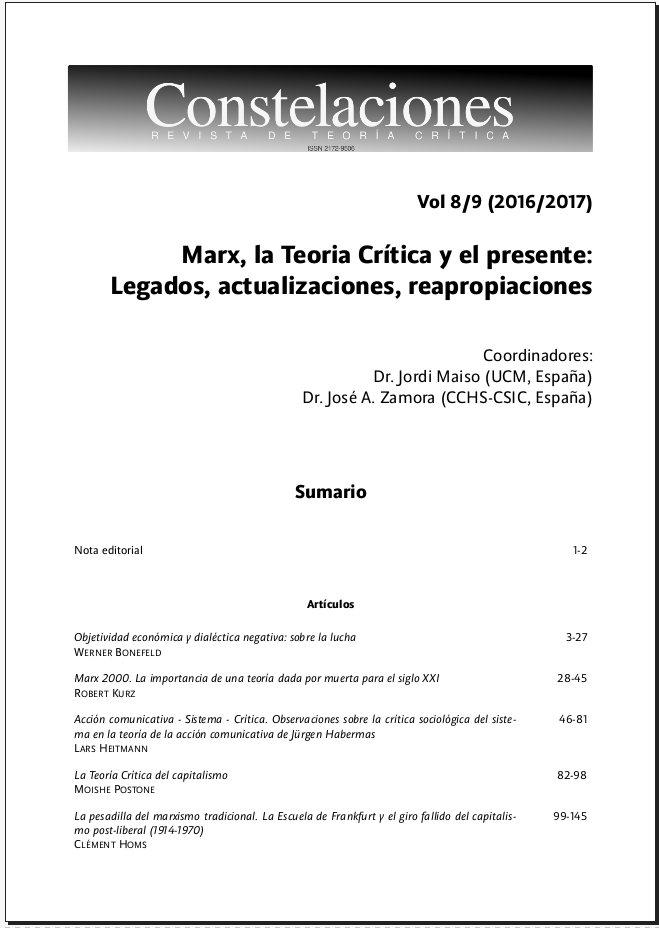Sociopolitics: Marx and Marcuse
Palavras-chave:
sociopolitics, Marx, Marcuse, Social Forms of Society, Critical TheoryResumo
By deciphering capitalist social forms of dependence of the political sphere relative to society, Marx discovers sociopolitics. Within it, the nexus between politics and social life occurs in a double key. On one side, politics is taken in its social dependence; on the other side, the focus must shift to the very social form determined by this dependence.
In sociopolitics, as a domination structure comanding social reproduction, power is in an immanent relation to the social forms of production in society. Beyond coercion or convincing, the social sphere is in itself political, with its common social objective condition of organization in a social determined form.
As Marx points out in the Grundrisse, the human beeing is a political animal not only in the sense of the social as collectivity, but as as a specific and determined social form of the social, already produced and in the reproduction process. Men individuate in the middle of a socialization, submitting themselves to the rationnality of the accumulation of capital and its contradictions. As capital is a contradiction by itself, in capitalist socialization there is a dialectics of domination and liberation of abstract capitalistic labor.
Marcuse follows Marx interpretation. For him, the objective condition characterizes a society as dependency on capital. As refered in One-dimensional Man, this dependency is in the social subject’s social form, rather than an imposition from the outside. The dependency is an outcome of the capitalist mode of production at the needs-engendering level – need of surplus labor – that is made universal.
To Marcuse, the political dispute is a dispute of forms of society: between the capital dependent society and a socialization form in which the need of surplus labor no longer suffices to the free developpment of the individualities produced in existing society. As stated in Counter-Revolution and Revolt, “the individual liberation must incorporate the universal in the particular protest, and the images and the values of a future free society must appear in the personal relationships within the unfree society.” In the present situation, transformation is linked with an anticipation of the possibility of an other socialization. “The time of the wholesale rejection of the ‘liberals’ has passed – or has not yet come. Radicalism has much to gain from the legitimate protest against war, inflation and unemployment, from the defense of civil rights (...) Presenting the facts and forces that made civilization what it is and what it could be tomorrow – that is political education”.
Downloads
Referências
MARCUSE, Herbert (1972) – Counter-Revolution and Revolt. Boston: Beacon
MARCUSE, Herbert (1991) – One-Dimensional Man. Boston: Beacon
MARX, Karl (1977) – Early Writings. London: Penguin
MARX, Karl (1981) – Grundrisse. London: Penguin
NEGT, Oskar & KLUGE, Alexander (1993) – Public Sphere and Experience. Minneapolis: University of Minnesota Press
OLLMAN, Bertell (2003) – Dance of the Dialectic. Chicago: University of Illinois Press
VOGL, Joseph (2013) – Le Spectre du Capital. Paris: Diaphanes
Downloads
Publicado
Como Citar
Edição
Secção
Licença
Aquellos autores/as que tengan publicaciones con esta revista, aceptan los términos siguientes:
1. Los autores/as conservarán sus derechos de autor y garantizarán a la revista el derecho de primera publicación de su obra, el cuál estará simultáneamente sujeto a la Licencia de reconocimiento de Creative Commons que permite a terceros compartir la obra siempre que se indique su autor y su primera publicación esta revista.
2. Los autores/as podrán adoptar otros acuerdos de licencia no exclusiva de distribución de la versión de la obra publicada (p. ej.: depositarla en un archivo telemático institucional o publicarla en un volumen monográfico) siempre que se indique la publicación inicial en esta revista.
3. Se permite y recomienda a los autores/as difundir su obra a través de Internet (p. ej.: en archivos telemáticos institucionales o en su página web) antes y durante el proceso de envío, lo cual puede producir intercambios interesantes y aumentar las citas de la obra publicada. (Véase El efecto del acceso abierto).
Confidencialidad de los datos
1. Constelaciones. Revista de Teoría Crítica garantiza que los datos que nos envíe serán utilizados únicamente para atender sus demandas manifestadas en este mensaje.
2. Sus datos no serán cedidos a terceros.
3. Cuando lo desee puede solicitar que sus datos sean eliminados de nuestros registros.





